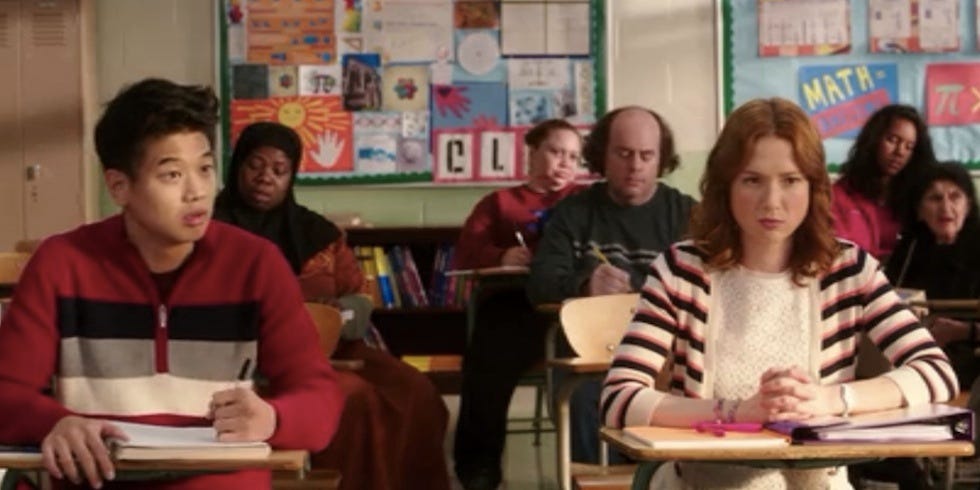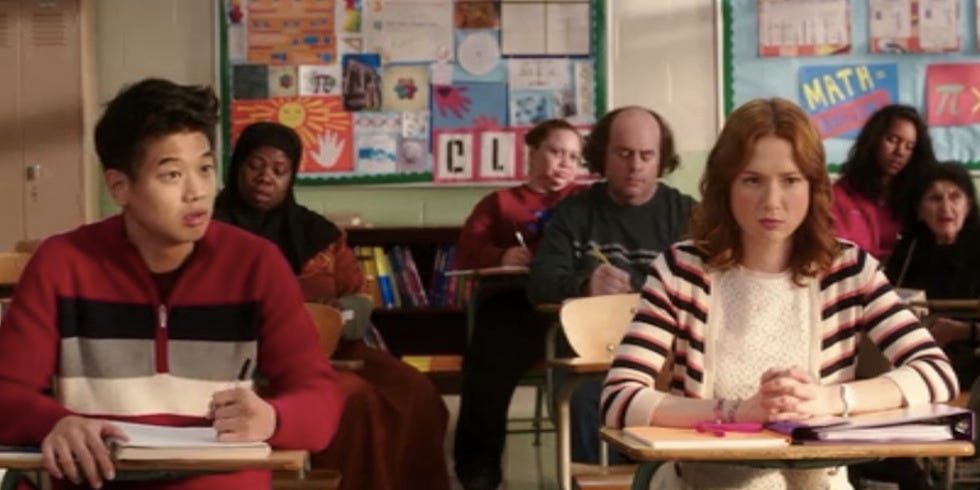By Molly Sanchez

I feel like Netflix is conspiring to never let us leave our homes on weekends again. This past weekend the streaming service rolled out the latest creation from my lord and savior Tina Fey called Unbreakable Kimmy Schmidt. The show tells the story of Kimmy (Ellie Kemper) a woman who was kidnapped and held in a bunker by a cult leader but is rescued and released into present day New York. While I absolutely loved the show and gobbled it up in one sitting, there were a few details that bothered me. Its dealings with race, for example, left a lot to be desired. Careful, beyond here are many spoilers.
The Good
This show is a feminist powerhouse! The cast of women is super strong. Ellie Kemper fills the Leslie Knope place in your heart by being a woman whose enthusiasm and kindness we can aspire to. Carol Kane is back on TV and showing serious comedic chops as Kimmy’s landlord and she has some of the best lines on the show. Jane Krakowski quasi-reprises her role as a grown up Jenna Maroney and is hilarious and obtuse but also believably emotional when she needs to be. This show passes the Bechdel test, not that I would expect anything less from Mrs. Bossypants herself.
The fashion is incredible. By putting Kimmy in florals and bright colors, the stylists for Unbreakable prove that feminine outfits can represent strength as much as they represent whimsicality. Home girl may be wearing flowers but you know she can kick butt.
Unbreakable is also significant because it involves a person of color as a main character with varied plot lines — still a rarity on too many modern TV shows. Kimmy’s roommate Tituss (Titus Burgess) often struggles as much as she does to make it in the city and their bond is genuine and fun to watch. He’s a strong character and he brings nuance to a role that could easily be one note. Sure, we’ve seen this super flamboyant gay friend character before, but I have faith that between Fey’s writing and Burgess’ acting, this character will be a force to be reckoned with.
Unbreakable also proves that TV is getting weird again, and I am down for that. Sure, being on Netflix vs. being on a network gives the writers the latitude to take big chances here, but even mainstream TV is becoming less afraid to get into unknown territory. Fans of Unbreakable should check out Will Forte’s incredible Last Man On Earth, which has the silly factor of Kimmy and 30 Rock with the cringeworthy real life humor of early The Office. Hopefully the success of Unbreakable and Last Man will prove that audiences can handle stories that are increasingly offbeat.
The Bad
Race is an issue here, there’s no way around it. Tina Fey has long struggled with how to be post-racially funny and sensitive to race issues at the same time. I think she did a good job in 30 Rock, where her character admitted to having white guilt (“it should only be used for good, like over tipping and supporting Barack Obama”) and the show had many plot lines revolving around black characters breaking stereotypes. A Think Progress article said it best: “that willingness to let black characters be not just smart, but weird, precise, and even deeply undignified, is part of what makes 30 Rock such a solitary phenomenon.”
Fey is good at spotlighting the obtuseness of white people in her characters. On Unbreakable, Tituss realizes that people on the street treat him more kindly when he’s in werewolf garb than when he’s in his own clothes. Carol Kane admits to accidentally shooting her black husband because “well, it was dark out and a black man was coming into my bed, it was the ‘70s!” These kinds of jokes poke fun at racial issues by making ridiculous reactions to race the punchlines.
Still, Kimmy is not without its race issues when it comes to people of color. The first black character we see in the show is during the first episode, when a neighbor is being interviewed after Kimmy and company are released from the bunker. His testimonial is silly, in the same vein of Antoine Dodson of “Hide Yo Wife” fame. This character is lampooned for his way of speaking, auto tuned for the theme song, and only brought back later to find that his life is ruined by his involvement with the case.
The only significant women of color are Dona Maria, Kimmy’s fellow sister wife, and Vera the maid. Both have lines in mainly in Spanish and have subservient roles. The news crawl comment in the opening sequence (“Three white women rescued: hispanic woman also found”) speaks volumes for the lack of women of color in this show and their one-note portrayals therein.
The Ugly
Two other depictions of race in this show stick out as too troubling to be ignored. The first is the mention of Jacqueline Voorhees’ (Jane Krakowski) Native American heritage. What this show does right, like Parks and Recreation before it, is to skewer stereotypical perceptions of Native people. Jacqueline’s dad jokingly referring to a plane as the “great iron eagle” is a good example of that awareness and immediate breaking of a stereotype. Still, the idea that Jacqueline, an obviously Caucasian woman, has two Native American parents is weird. The joke here is “wouldn’t it be funny if this white girl was secretly Native” implies that she succeeded despite being Native. The joke the show wants to make is that Jacqueline comes from humble beginnings despite the airs she puts on now, a gag that could happen without cultural appropriation. It comes off like another instance of a white person playing a culture they are not.
The second problematic issue is the portrayal of the show’s only Asian character. Lets start with the name, Dong Nguyen. Didn’t we get over that joke in 16 Candles? To be fair, they neutralize this joke by having Dong tell Kimmy that her name also means something obscene but still, not cool. Ki Hong Lee, the actor who portrays Dong, doesn’t have a strong accent in real life but his character on the show adopts an almost Mickey Rooney Breakfast At Tiffany’s-like way of speaking ( complete with the obligatory l’s vs. r’s joke). Heck, he’s even Kimmy’s math tutor, another stereotype they try to joke away. Kudos to the show for having the main love interest be someone of another race than Kimmy, but no points awarded for making a good actor play such a gross stereotype.
Hopefully as Unbreakable Kimmy Schmidt develops over time, its rapid fire humor will persist and its problematic treatment of race will not.







